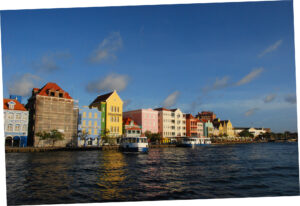Responsibilities of corporate citizens
Ports, unless singularly located on an island, will butt on at least one community. And often because of the sheer size of its footprint, will find more than one community as neighbours just beyond the perimeter fence.
Communities are complex social units, for the diversity of individuals, persuasions, vocations and capabilities; and, the mix of business ventures and social organisations. The ratios vary, giving communities identifiable characteristics and individuality.
 The seaport is a part of the community. In most instances the residential sector of that community pre-dates the port. And, generally, employment at the port, directly or indirectly, sustains its neighbour communities.
The seaport is a part of the community. In most instances the residential sector of that community pre-dates the port. And, generally, employment at the port, directly or indirectly, sustains its neighbour communities.
The port is a part of their lives, individually and collectively. Indeed, it is an important member of the community. And most ports do embrace this relationship. This is different from the relationship which the port enjoys with the country.
In its relationship with the state, the port is a corporate citizen, entitled to most of the rights, privileges and protection enjoyed by individuals. However, many ports were initiated by legislation, public guarantees and capital support from the public purse. And, particularly in island states, the port bears the weight and responsibility of an essential service, for obvious reasons, and also carries the awesome responsibility of protecting the home environment from invasive species brought by maritime traffic; and, in its function of Port State Control, protecting the harbour from dangerous shipping.
In both relationships, the port, as an entity, is expected to assume its role as a functioning member of both local and national communities because it is a corporate citizen and enjoys the rights and protection guaranteed to all citizens.
In embracing its roles as a functioning member of the community, actively engaged and faithfully delivering on its pledges and commitments, the port contributes to development, which stimulates growth and generates returns on initial investments in its construction and development.
The essay on Port-City Relation in the hemisphere (Portside Caribbean #17, April 2020 pg 33) is instructive. In listing areas for possible co-operation, the writers concluded that such social interaction and collaboration make local economies thrive and “…the port will be prone to be an actor in the global scheme reaching other markets, attracting investments, creating and retaining talent.”
Urgent situations
The most urgent situation the world faced as this edition for Spring 2020 went to press was the global pandemic of the corona virus or COVID-19. While the most urgent situation that Earth faced was a shortened time-frame in which irreparable damage will be done to the only ecology that can sustain the human form. With respect to the former, without an effective vaccine, communities are faced with challenges beyond their capacity to control. With the latter, however, there is still time, but barely enough.
Port organizations may find it worthwhile to use this teachable moment of Climate Change to urgently promote and solidly support local and national community efforts to reduce CO2 in Earth’s atmosphere. The tree-growing solution is doable, if executed in properly managed projects (see page 12). The objective however must be ‘growing’ not simply ‘planting’… which often amounts to burying seedlings. he two are not interchangeable. ‘Growing’ means cultivating. I would posit in an equation, that P+S+M=C, where P=planting, S=science, M=management and C=cultivation. In this regard, the port should be able to contribute directly and indirectly to development and delivery of two of these factors, joining with the community at the P (planting) stage and in development of management models.
The tree science is readily available. However, it is leadership that will break inertia. And that the ports can provide, if Boards of Directors make port-community relation a policy and instruct their executives accordingly.
Seaports should make Climate Change a policy priority, like all other well-thinking citizens should.
Let’s deal with CO2 now. This is serious. []
- First published March 31, 2020
 Mike Jarrett
Mike Jarrett
Editor-in-Chief






